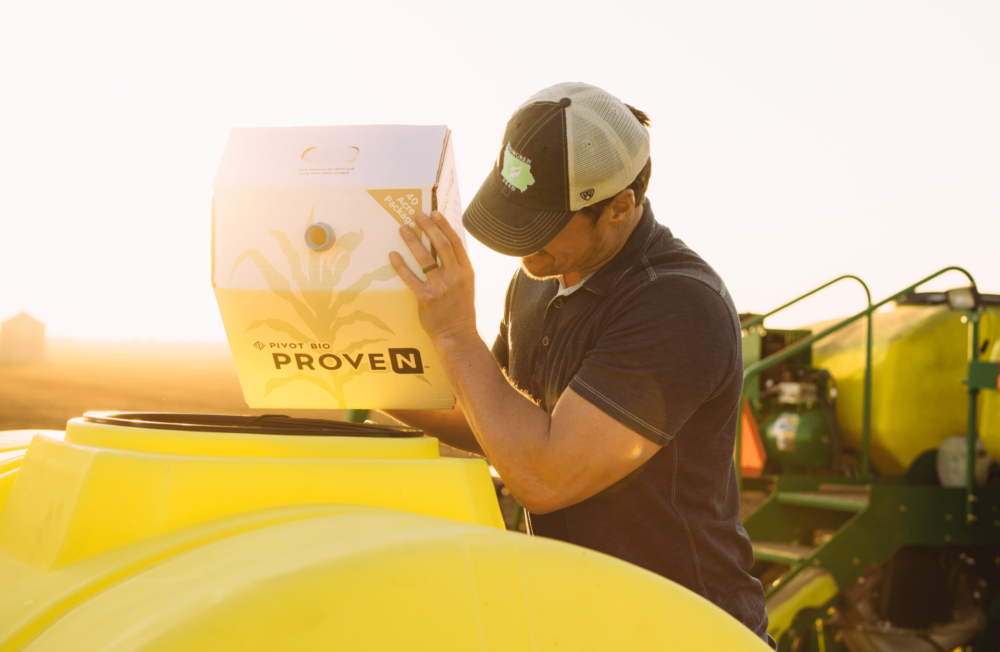- Nitrogen innovator Pivot Bio‘s revenue hit a milestone by surpassing the $100 million mark, the company reports in its FY2023 results.
- US farmers are now using Pivot Bio’s microbe-based, nitrogen-fixing product in place of synthetic nitrogen on 5 million acres of corn.
- Co-founder Karsten Temme will become the company’s chief innovation officer, passing the CEO role to veteran agtech investor Chris Abbott.
- The company will expand its manufacturing and distribution in the US with the opening of a few different facilities.

At a glance: Pivot Bio FY2023
The company says its revenue grew more than 60% in 2023 and surpassed $100 million for the first time.
Growth was due to more than 95% net revenue retention (NRR) from Pivot Bio’s 2022 grower cohort and over 190% NRR from 2020 and 2021 cohorts.
Farmers in the US are now using Pivot Bio products on more than 5 million acres of corn, up from just over 3 million acres in FY2022.
Pivot Bio notes this is the fourth consecutive year for revenue growth and acres.
From nascent startup to ‘essential product’
Pivot Bio told AgFunderNews earlier this year that more growers “want to get out of synthetic nitrogen” because they recognize the harm it causes to human and environmental health.

About half of all nitrogen applied to cropland is lost due to over-application or application at the wrong time. The resulting nitrogen runoff pollutes waterways and can create toxic algae that depletes oxygen in the water and creates coastal dead zones. These algal blooms also emit greenhouse gases.
On top of that, nitrogen is one of a grower’s most expensive inputs — a point unlikely to change anytime soon.
Temme and Pivot Bio co-founder and CSO Alvin Tamsir spent a number of years in laboratories, greenhouses and on-farm trials before releasing PROVEN, the company’s first commercial product for corn, in 2019. The microbial product fixes nitrogen from the atmosphere and secretes it at the corn plants’ root zones, where it can be used when the plant actually needs it.
Pivot Bio’s PROVEN 40 product for corn currently replaces about 20% of a grower’s synthetic nitrogen.
“One of the big things that we’ve been successful doing at Pivot is developing a game changing breakthrough technology,” Temme tells AgFunderNews.
“Fertilizer itself being so inefficient and unpredictable in its performance, the way we’ve gone about building products and the underlying technology based on microbes is a step change to a better place, a better level of productivity and efficiency, and ultimately economics for the farmer and sustainability for all of us around the planet.”
Now, he says, Pivot Bio is in a position very few companies get to experience: “To go from a brand-new, nascent startup to a company that is delivering an essential product that is one of the biggest expenses on any farm, and doing it in a way that improves both the bottom line and the predictability of that operation.”
A leadership pivot
With the company in the midst of what he calls “a really momentous time,” Temme will shift out of his CEO role, passing the baton to ag industry veteran and Pivot Bio board member Chris Abbott.

Abbott is probably best known as co-head of Continental Grain Company‘s Conti Ventures, which he helped launch in 2018 and has been with for the last five years.
“I haven’t seen a business in its first four years do out of the gate what Pivot did,” he says of the company’s growth. “We [Continental Grain Company] invested in this company in 2018, and had some field trial data. We’re sitting here now less than five years to the day — four growing seasons — declaring $100 million in revenue at a massive growth rate.”
These types of success stories are practically unheard of in the agricultural industry, he adds. “There isn’t one in ag, and I would challenge anyone to give me that type of trajectory.”
As the company treks beyond $100 million (“What’s more than $1 billion in revenue going to look like?”), Abbott will bring his access to talent, complementary products and strategic relationships that could be leveraged in the future.
Temme, who holds a Ph.D. in bioengineering from UC Berkeley, will stay with Pivot as chief innovation officer.
“There’s no better visionary and technologist in in-season fertilizer than Karsten, period,” says Abbott. “It’s why [Continental Grain Ventures] invested five years ago, and I’m more certain now than I was then having lived it together.”
For his part, Temme says it’s “a great time to be able to welcome Chris to the team.”
“I look to his leadership in helping us navigate the challenges of being able to move internationally, to be able to scale what we’re doing in the US to even greater heights, and then for me to help accelerate everything we do to deploy innovation on an even faster scale.”

What’s next for Pivot
When such an international expansion might happen is still up in the air. Without delving into specifics, Abbott lists Canada and South America as two potential expansion targets the company could hit “in due time.”
“We want to serve as many growers as we can. We’re very fortunate that our product actually translates region to region.”
In the more immediate future, Pivot Bio will increase its manufacturing and distribution around the US.
As part of its FY2023 results, the company announced a 48,000-square-foot facility in St. Louis that will develop, produce and manufacture both PROVEN and the company’s RETURN product for wheat.
Pivot also announced a 110,000-square-foot distribution center in Omaha, Nebraska to serve corn growers in the Corn Belt and Western US. Meanwhile, a new facility in the Iowa State University Research Park will open later in 2023 and serve as a Midwest hub for the company.
“A lot of the success that we’re seeing is driven by the success that our customers are seeing on the ground in the field,” notes Mitchell Craft, Pivot’s director of communications. “We would not have hit 5 million acres of product sold if we weren’t seeing results and if [customers] weren’t seeing a higher return on investment.
“This is as much a statement about Pivot as it is about the benefits we’re bringing to our customers and the results that they’re seeing on the field. We’re excited to see where that’s going to lead and the sustainability that’s going to come with that.”




